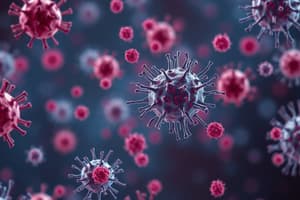Podcast
Questions and Answers
Which cells primarily process antigens in the immune system?
Which cells primarily process antigens in the immune system?
- Macrophages
- Dendritic cells (correct)
- B cells
- T cells
What is the term for the subset of T cells that regulate the immune response?
What is the term for the subset of T cells that regulate the immune response?
- T-cytotoxic cells
- T-helper cells
- T-regulatory cells (correct)
- T-memory cells
Which type of immunity involves the transfer of preformed antibodies or T lymphocytes from a donor to the recipient?
Which type of immunity involves the transfer of preformed antibodies or T lymphocytes from a donor to the recipient?
- Innate immunity
- Passive immunity (correct)
- Acquired immunity
- Active immunity
What type of antigens are small-molecular-weight antigens that are not themselves immunogenic?
What type of antigens are small-molecular-weight antigens that are not themselves immunogenic?
Which molecule is responsible for binding antigen in the B cell receptor complex?
Which molecule is responsible for binding antigen in the B cell receptor complex?
Which molecules present endogenous protein antigens in the immune system?
Which molecules present endogenous protein antigens in the immune system?
Where are the MHC genes located in humans?
Where are the MHC genes located in humans?
What determines the class of antibody in the immune system?
What determines the class of antibody in the immune system?
Which type of immunity is produced after natural exposure to an antigen or after immunization?
Which type of immunity is produced after natural exposure to an antigen or after immunization?
What is the term for the cluster of genes found on human chromosome 6, which are also called HLA antigens?
What is the term for the cluster of genes found on human chromosome 6, which are also called HLA antigens?
What is the main characteristic that distinguishes adaptive immunity from innate immunity?
What is the main characteristic that distinguishes adaptive immunity from innate immunity?
Which cells are responsible for cell-mediated immunity?
Which cells are responsible for cell-mediated immunity?
What is the function of B lymphocytes in the immune response?
What is the function of B lymphocytes in the immune response?
What is the process called when B and T cells have an extensive diversity of antigen receptors capable of recognizing different antigens?
What is the process called when B and T cells have an extensive diversity of antigen receptors capable of recognizing different antigens?
Which type of immunity is mediated by circulating antibodies?
Which type of immunity is mediated by circulating antibodies?
What is the main function of T lymphocytes in the immune response?
What is the main function of T lymphocytes in the immune response?
What makes the adaptive immune response much longer lived compared to the innate inflammatory response?
What makes the adaptive immune response much longer lived compared to the innate inflammatory response?
What initiates the clonal selection of B and T cells?
What initiates the clonal selection of B and T cells?
Which type of immune response consists of lymphocytes and serum proteins called antibodies?
Which type of immune response consists of lymphocytes and serum proteins called antibodies?
What is the main function of cells of the innate system in the adaptive immune response?
What is the main function of cells of the innate system in the adaptive immune response?
Flashcards are hidden until you start studying
Study Notes
Antigen Processing and Immune Response
- Dendritic cells and macrophages are the primary cells that process antigens in the immune system.
T Cell Regulation and Immunity
- The term for the subset of T cells that regulate the immune response is T regulatory cells.
- Passive immunity involves the transfer of preformed antibodies or T lymphocytes from a donor to the recipient.
Antigens and Immune Response
- Haptens are small-molecular-weight antigens that are not themselves immunogenic.
- The molecule responsible for binding antigen in the B cell receptor complex is immunoglobulin.
- MHC (Major Histocompatibility Complex) molecules present endogenous protein antigens in the immune system.
Genetics and Immunity
- The MHC genes are located on human chromosome 6.
- The class of antibody in the immune system is determined by the heavy chain constant region.
- The cluster of genes found on human chromosome 6, also called HLA antigens, is referred to as the Human Leukocyte Antigen complex.
Adaptive Immunity
- Adaptive immunity is produced after natural exposure to an antigen or after immunization.
- The main characteristic that distinguishes adaptive immunity from innate immunity is specificity.
- T cells, specifically T lymphocytes, are responsible for cell-mediated immunity.
- The function of B lymphocytes in the immune response is to produce antibodies.
- The process of B and T cells having an extensive diversity of antigen receptors capable of recognizing different antigens is called clonal selection.
- Humoral immunity is mediated by circulating antibodies.
- The main function of T lymphocytes in the immune response is to recognize and eliminate infected cells or produce chemical signals that activate other immune responses.
Immune Response Characteristics
- The adaptive immune response is much longer lived compared to the innate inflammatory response due to the generation of immunological memory.
- The clonal selection of B and T cells is initiated by antigen recognition.
- The immune response that consists of lymphocytes and serum proteins called antibodies is called humoral immunity.
- The main function of cells of the innate system in the adaptive immune response is to provide an early defense against infection and activate the adaptive immune response.
Studying That Suits You
Use AI to generate personalized quizzes and flashcards to suit your learning preferences.



